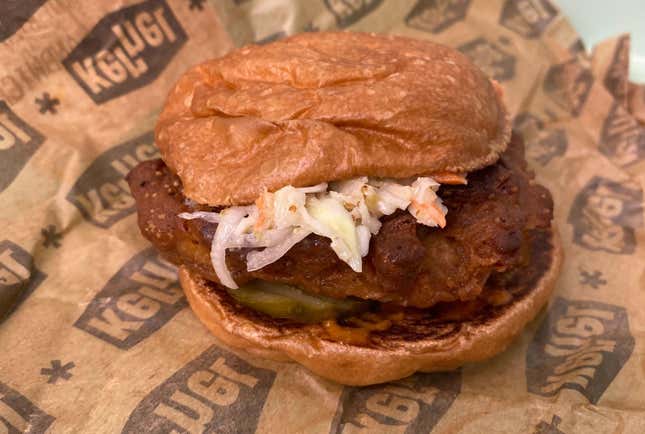
It was always only a matter of time before our fast food restaurants resemble every science fiction story ever written. It’s already become the norm for these establishments to replace human cashiers with kiosks that are usually out of order, but at Kernel, the latest concept from Chipotle founder Steve Ells, robots perform the work of making the food, too.
Kernel is the latest high-profile attempt to revolutionize restaurants—essentially, it’s a cross between a fast food joint and an automat. You place your order on the Kernel website or app, get a notification when it’s ready, and pick it up from an on-site locker. So far there’s only one location, situated in the Gramercy neighborhood of Manhattan, though according to the website more locations are on the way.
Everything on the Kernel menu is plant-based, which immediately made me turn my nose up. But I was pleasantly surprised by the new fried cauliflower at Dave’s Hot Chicken, so hey, maybe Kernel can make a convert out of me.
Kernel’s robotic fast food, explained
The ordering process at Kernel was just like ordering to-go from any other restaurant’s app. When I got to the storefront, I expected it to be a soulless glimpse into the dystopian, robot-run future, so I was pleasantly surprised when someone immediately greeted me at the door. There were also two employees working in the wide-open kitchen, while several other employees were schmoozing with guests. Ells himself was even there talking to customers, though he left shortly after my arrival.
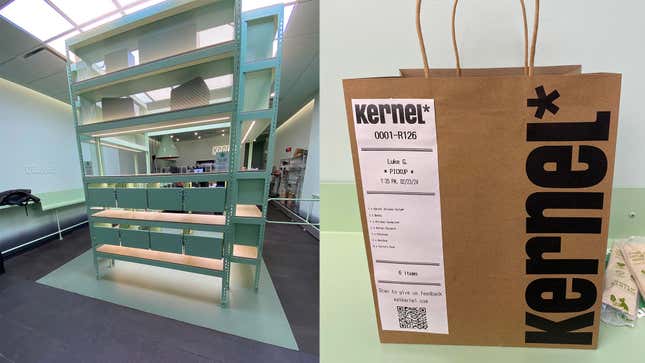
The employee who greeted me eagerly explained the inner workings of the operation. It turns out the kitchen isn’t fully robot-run, but rather robot-assisted: All the food is made by humans in an off-site kitchen every morning, portioned, and then shipped to the storefront.
When a hot item is ordered, a large robot takes it and places it into the oven. Salads are also automatically dispensed, dressed, and tossed by a machine, so every salad it pumps out is identical. The kitchen employees put toppings on sides, assemble the order, and place it into the locker to be picked up by the customer. So, besides the salads, robots aren’t actually making your food, per se, they’re just heating it.
How does Kernel’s food taste?
The menu is pretty small, so I tried one of everything. Kernel offers your typical fast food fare, (vegan) burgers and (vegan) chicken sandwiches, as well as salads, vegetable sides, and cookies.
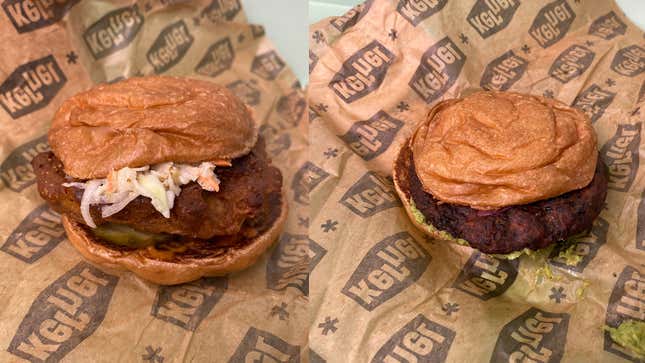
The star of the menu is easily the “chicken” sandwich with coleslaw, pickles, and chipotle mayo. The patty is crispy, chunky, and hunky, and it honestly tastes just like chicken. It could go toe-to-toe with the likes of Popeyes, KFC, and Chick-fil-A, but since it costs $9, I don’t see myself, a non-vegetarian, ever opting for this over one of the leading fast food offerings.
The burger, meanwhile, is hugely disappointing. It costs a reasonable $7, but it presents no differently than a $2 McDonald’s burger, sad, flat, and lifeless—and it didn’t get any better once it hit my mouth. The meatless burger patty is made with a cacophony of different vegetables and grains, and it tastes like potpourri as a result. A simple black bean patty and a little bit more height on the burger would have made it vastly more appealing; I couldn’t take more than two bites of this one.
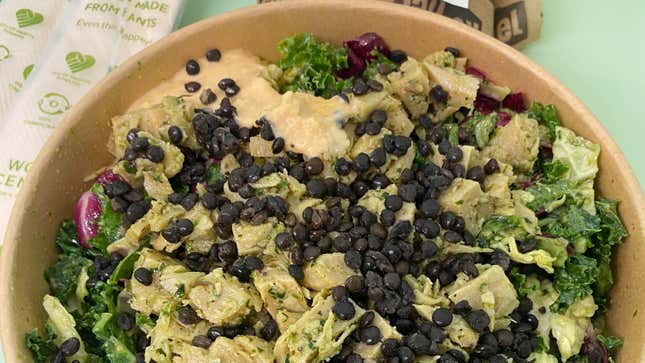
The robot-made Kernel salad with vegan chicken is pretty good. Priced at $14, it’s clearly positioned to compete with Sweetgreen and Chopt—and since you know exactly when your order is ready, there’s no line wrapping all the way around the block. The sizable portion features a mix of kale, cabbage, and radicchio, which gives it a multidimensional texture. Mine featured a tiny dollop of hummus in the corner, but it seemed random and out of place; if it’s an intentional element of the salad, there should be more of it, and it would make more sense if it were served in the center of the bowl.
Kernel’s menu includes a handful of vegetable sides: marinated beets, crunchy cucumbers, roasted carrots, and crispy potatoes. (Although it’s a hotly contested topic, potatoes are technically a vegetable.) The latter taste way better than your average french fries, as you can tell that they’re actually made from fresh potatoes. They look homemade and come with a side of house-made ketchup, though I enjoyed dipping them in the (vegan) chipotle mayo, available for an extra dollar. The beets, too, are worth ordering. They’re nice and sweet, with a lovely crunch and added heft from the pumpkin seeds and quinoa sprinkled in.
I’m a bit conflicted about the crunchy cucumbers. The cashews, mint, and cilantro give this dish a light and fresh feel, but the chili jam on top throws the whole thing off balance. It’s too heavy and too sweet, and honestly ruins the dish for me. It would be great without the chili jam, but unfortunately it doesn’t seem possible to modify any menu items, aside from removing nuts.
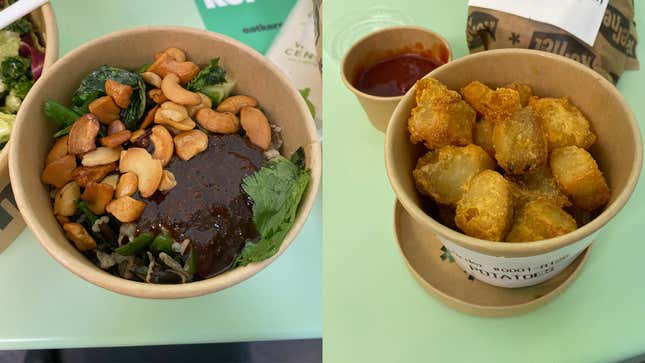
The sleeper hit on the Kernel menu is, of all things, the roasted carrots. They’re mixed with farro, roasted dates, and spiced almonds, then topped with avocado-based salsa verde. Unlike the sauce on the cucumbers, this condiment complements the other ingredients perfectly, lending delightful sweetness and crunch. The carrots themselves are just the right consistency, not too tough and not too mushy. I would definitely order this again.
For dessert, Kernel offers two vegan cookies, a chocolate chunk and an oatmeal raisin walnut. While I, like most people, assumed I would prefer the chocolate one, I actually prefer the oatmeal raisin, which is bigger and sweeter than its counterpart. I’m not the only one who thinks so, either. One of the employees told me that most people who try both cookies prefer the oatmeal raisin.
That isn’t to say the chocolate chunk is bad, though. One-third of the cookie’s weight is pure chocolate, so you get a mouthful of the good stuff in every bite. It really is a chocolate chunk cookie, not chocolate chip. But it has a strange, sandy texture that put me off, and it wasn’t very sweet. Maybe the lack of sweetness will appeal to some, even if it tastes less like a full-on dessert.
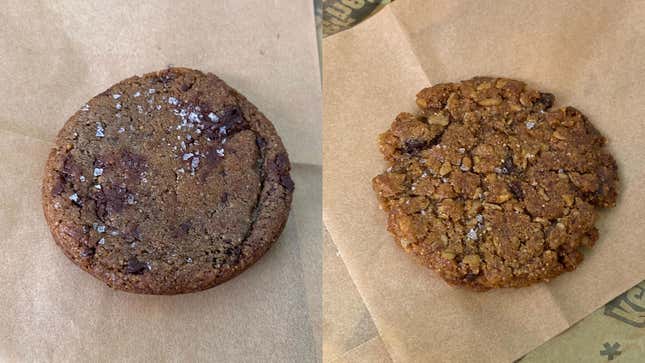
Is ordering Kernel worth it?
Being generally anti-AI in many respects, I have mixed feelings about Kernel. On the one hand, this restaurant wants to make it clear that it’s using AI to help humans rather than replace them. The fact that there were so many employees interacting with customers demonstrates that Kernel values the personal touch and isn’t trying to do away with that. But at the same time, it felt like there was so much emphasis on maintaining human interaction that it verged on overbearing.
The atmosphere was palpably chipper, as only a brand-new restaurant location can be: Every few minutes someone would come up to me to ask how I liked everything, and then proceed to explain each item’s origin story, complete with buzzwords like “delicious, high-quality ingredients,” “local woman-owned supplier,” and “reduced carbon emissions.” Maybe it was clear to them that I was writing a review—I ordered one of everything and was taking notes—but it created an unnatural vibe that made it harder to experience the place on my own terms.
Going into this review, I had one big question: If the whole idea behind replacing humans with robots is to save on labor costs, are those savings being passed on to the consumer? The pricing at Kernel is on par with comparable fast food spots in Manhattan, and in the case of the $9 chicken sandwich, the price skews more toward fast casual rates. I wondered if Ells, who has previously come under fire for his high salary, was using Kernel to buy and flip another $35 million townhouse.
He might be, but it seems that at least some of Kernel’s savings in labor costs are being passed on to employees. The kitchen workers make more than $25 an hour and receive a full benefit package, while the same job at a place like McDonald’s would pay $16 (minimum wage in NYC) and provide no benefits. Kernel is creating fewer jobs than it would if it were fully human-powered, but the fewer jobs are better paying. Quality over quantity, I suppose.
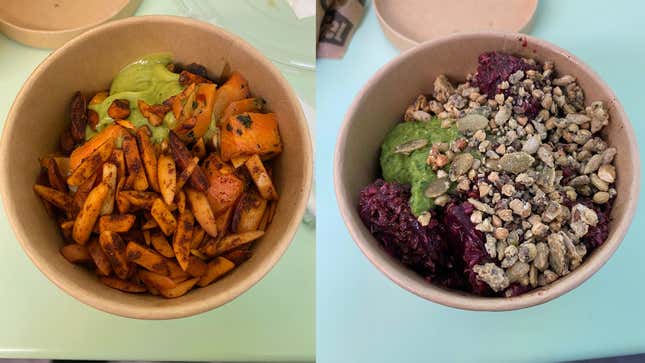
All in all, the food at Kernel is pretty good. The price point is higher than fast food, but lower than fast casual, and with the limited amount of dining space, Kernel is clearly meant to be a grab-and-go operation, a cheap, quick lunch place for office workers in the nearby Flatiron District. Once Kernel starts marketing itself in earnest, I think it’ll be a big hit.
What Kernel means for the future, however, remains uncertain. What happens when the robot inevitably experiences technical difficulties? Will additional robots eventually replace the kitchen employees? We’re safe from the AI apocalypse for now, but it’s not unreasonable to think that the first fully robot-run restaurant might soon open its pod bay doors.